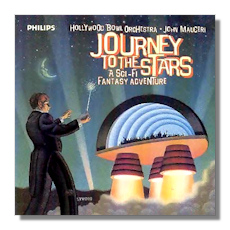
The Internet's Premier Classical Music Source
Related Links
- Latest Reviews
- More Reviews
-
By Composer
-
Collections
DVD & Blu-ray
Books
Concert Reviews
Articles/Interviews
Software
Audio
Search Amazon
Recommended Links
Site News
 CD Review
CD Review
Journey to the Stars

A Sci-Fi Fantasy Adventure
Hollywood Bowl Orchestra/John Mauceri
Philips 446403-2 DDD 73:11
Say what you will about film music, it's a bridge that's gotten many young people interested in classical music. It isn't far from John Williams to Holst and Prokofieff (in fact, it's too close for some listeners!) and from Bernard Herrmann to Bartók. The science fiction/fantasy film genre has produced many entertaining film scores in the past three decades, and more than a handful of even more admirable ones from the three decades before that. "Journey to the Stars" samples that sixty-year period. Although it doesn't contain any great surprises, it's musical escapism that's easy to enjoy, even as we grumble.
In fact, there's nothing on this disc that isn't already on CD, unless we count the newly-extended versions of Franz Waxman's "The Bride of Frankenstein" and Sir Arthur Bliss's "Things to Come." The former, which includes a theme suspiciously similar to "Bali Ha'i" (Waxman got there first), is harsher than on Charles Gerhardt's RCA recording, probably because of changes in orchestration. Gerhardt's version is more concise and romantic-sounding. Music from "Things to Come" has been recorded by Sir Charles Groves (excellently) and by Bernard Herrmann (capably). Here, Mauceri has rearranged some of the numbers and found room in the Hollywood Bowl for a chorus, but the effect is more garish than grand. Speaking of grand, I like Mauceri's brisk tempo for the "Throne Room" sequence of "Star Wars" (no Main Title, thank Gawd). He's also very successful with Danny Elfman's otherworldly music for "Edward Scissorhands." Williams' "Devil's Dance" from "The Witches of Eastwick" is great fun until one realizes that the composer won't (or can't) do much with the tune except repeat it – not Mauceri's fault, of course. A mini-suite from "2001: A Space Odyssey" unnecessarily includes Richard Strauss's Zarathustra music (not again!), and a new recording of Ligeti's Atmospheres. Mauceri can't blend his orchestra's tone colors together the way that Abbado does in his recording, so buyers specifically interested in this work should stay away. Interestingly, Mauceri includes Alex North's original fanfare; Kubrick was right to discard it in favor of the Strauss (which was a temp track) – North's creation is too militaristic, even pompous, for the film. (By the way, Mauceri has the nerve to call the film's images "dated.") There are shorter excerpts from Herrmann's "The Day the Earth Stood Still," Jerry Goldsmith's "Star Trek V: The Final Frontier," John Corigliano's "Altered States" (a bomb of a performance, unfortunately), and some electronic music from "Forbidden Planet" (Louis and Bebe Barron) and from Karl-Birger Blomdahl's space opera Aniara – worth hearing in its entirely.
The engineering is excellent, but too many "special effects" à la Telarc have been added. The lightning in "Bride" and collapsing buildings in "Things to Come" will frighten your dogs and small children.
Copyright © 1996, Raymond Tuttle


















